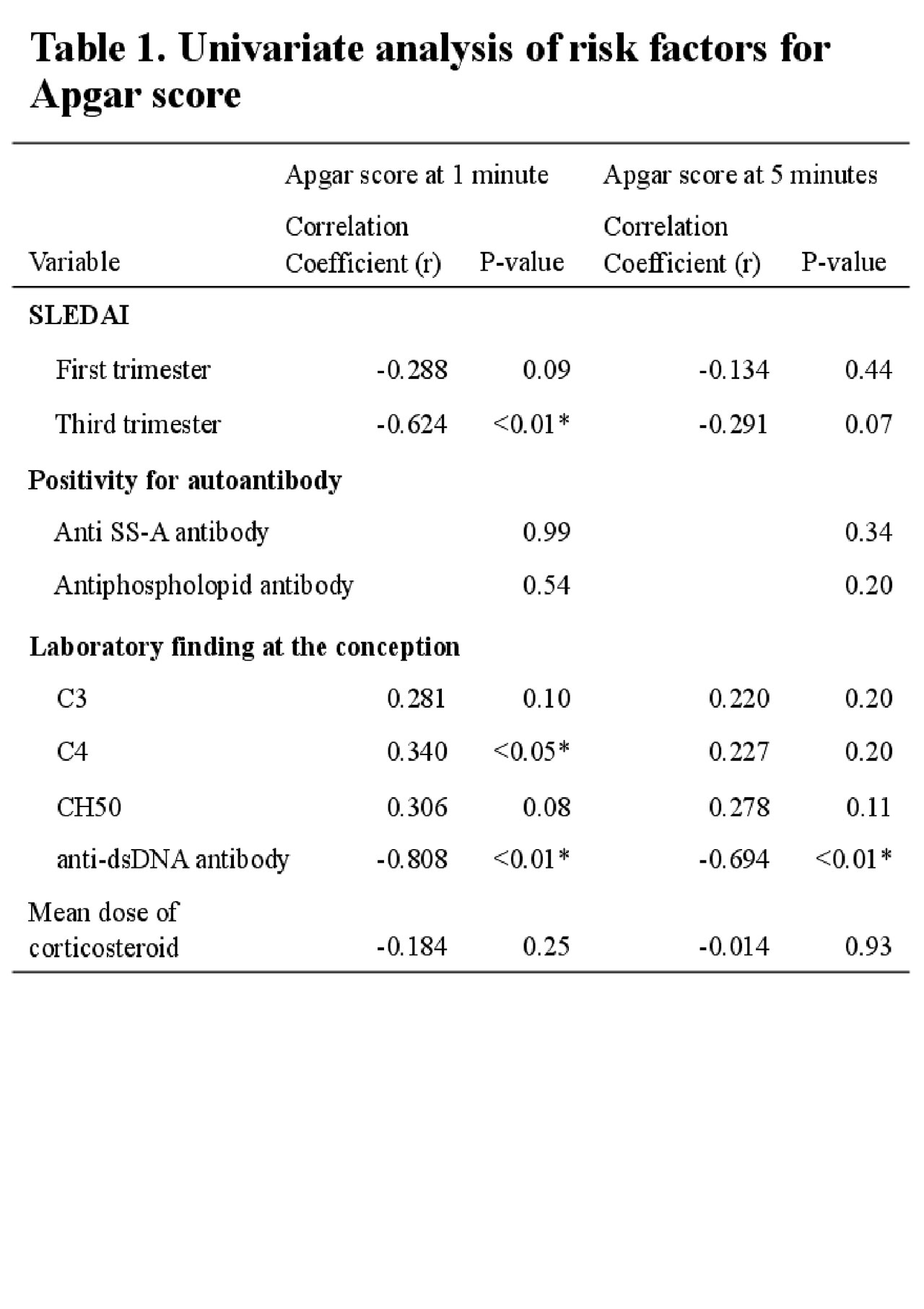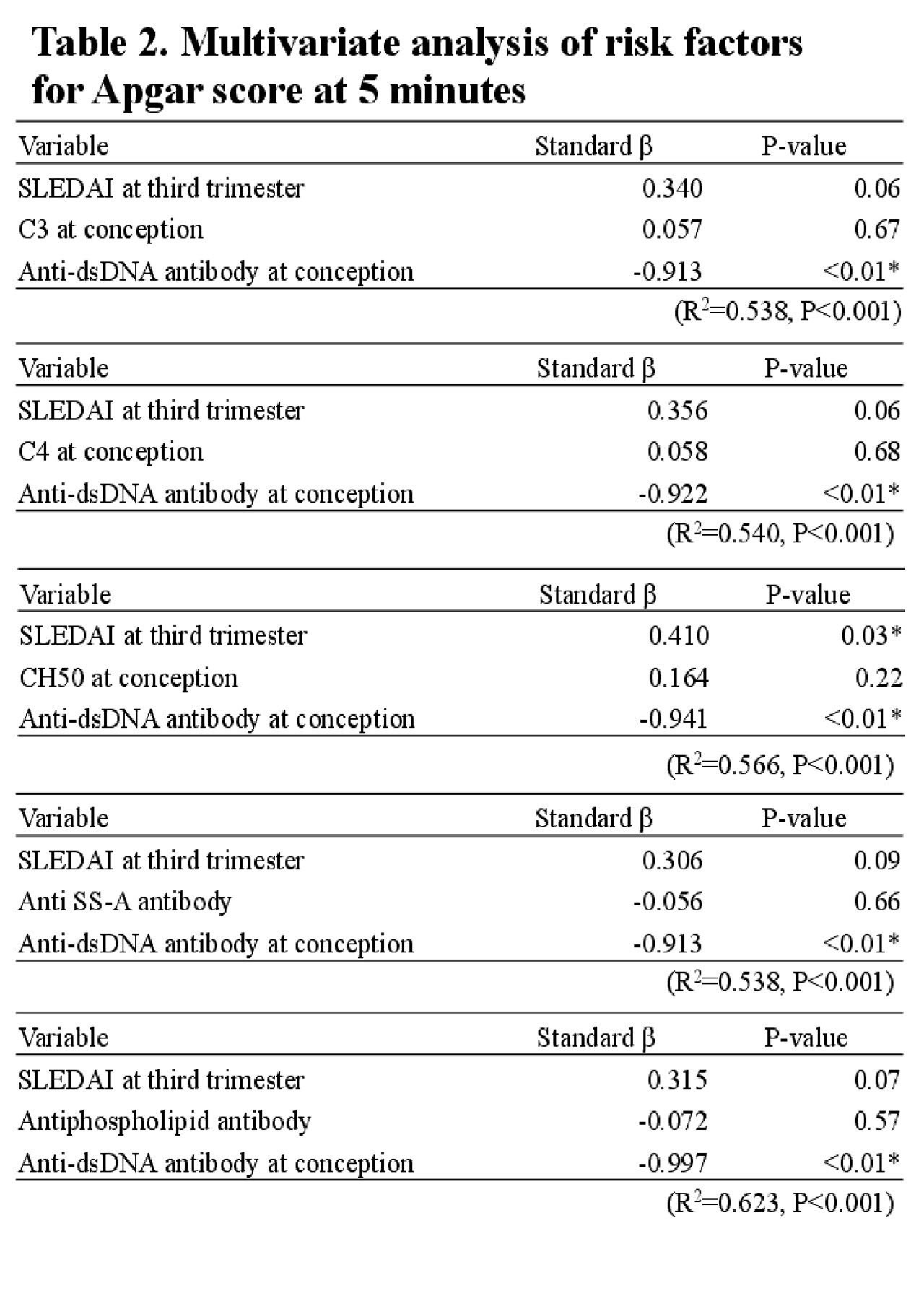Session Information
Session Type: Poster Session (Tuesday)
Session Time: 9:00AM-11:00AM
Background/Purpose: Recently, the progression of treatment strategy enabled many systemic lupus erythematosus (SLE) women to become mothers. On the other hand,
some reports have revealed another important problem about the associations between maternal SLE and neurological abnormalities including learning disorders and autism spectrum disorders among the children born to SLE mothers. However, it is unknown which factors influence neurological disorders on these children.
Apgar scores is widely used as a common clinical index for assessing neonatal health status after birth. Especially, Apgar score at five minutes is demonstrated as a predictive index for neurological, cognitive, and psychological abnormalities of newborns. There is no report about the association between maternal SLE and Apgar score of newborns. The aim of this study is to identify risk factors for low Apgar scores of newborns from SLE mothers.
Methods: We
investigated the data of 41 newborns who were delivered from SLE mothers from May 2006 to May 2019. SLE mothers were treated at Kagawa University Hospital from preconception counseling to pregnancy and delivery. We analyzed the association between SLE disease activities, autoantibody profiles, laboratory findings, treatment agents, and Apgar scores of newborns.
Results: In 41 newborns, the mean gestational weeks of delivery was 37.9 ± 2.8 weeks, and preterm birth occurred in nine cases (23.1%). The mean birth weight of newborns was 2754.0 ± 626.4 grams. Five newborns (12.8%) were light-for-date (less than the 10th percentile).
Table 1 showed univariate analysis of Apgar scores, which revealed that Apgar scores at one minute were related with SLEDAI score during the third trimester (P< 0.01), complement level of C3 (P< 0.05) and the titer of anti-double stranded DNA (ds-DNA) antibodies at the conception (P< 0.01). Additionally, Apgar scores at five minutes were associated with the titer of anti-dsDNA antibodies (P< 0.01). In multivariate analysis, there was a significant association between low Apgar scores at five minutes and high titer of anti-dsDNA antibodies (P< 0.01, Table 2).Other parameters including autoantibodies and corticosteroid dose were not associated with low Apgar score in either the univariate or the multivariate analysis.
Conclusion: In our retrospective study, high titer of anti-dsDNA antibodies at conception was a risk factor for low Apgar scores at both one minute and five minutes of newborns who were delivered from SLE mothers.
Therefore, we speculate that high titer of anti-dsDNA antibodies might be a risk factor for children’s physical or neurological development.
There is a need for long-term follow-up studies focusing on the neurological development of children born to SLE mothers.
To cite this abstract in AMA style:
Shimada H, Wakiya R, Mahmoud Fahmy Mansour M, Nakashima S, Kato M, Miyagi T, Kameda T, Dobashi H. The Titer of Anti-Double Stranded DNA Antibody Could Affect the Apgar Score of Newborns, Which Is Considered as the Predictive Clinical Index for Neurological or Physical Development [abstract]. Arthritis Rheumatol. 2019; 71 (suppl 10). https://acrabstracts.org/abstract/the-titer-of-anti-double-stranded-dna-antibody-could-affect-the-apgar-score-of-newborns-which-is-considered-as-the-predictive-clinical-index-for-neurological-or-physical-development/. Accessed .« Back to 2019 ACR/ARP Annual Meeting
ACR Meeting Abstracts - https://acrabstracts.org/abstract/the-titer-of-anti-double-stranded-dna-antibody-could-affect-the-apgar-score-of-newborns-which-is-considered-as-the-predictive-clinical-index-for-neurological-or-physical-development/


